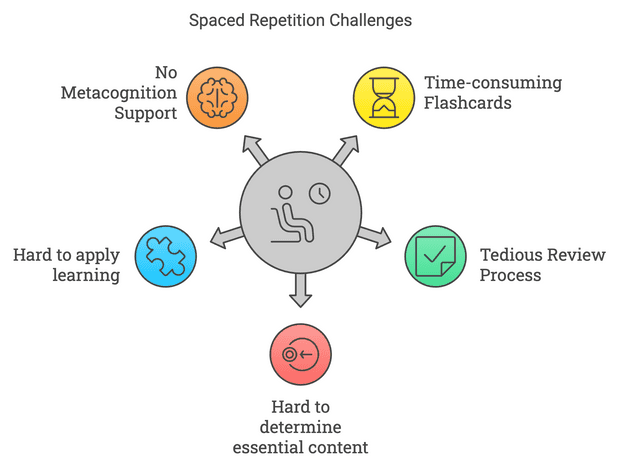This is still an evolving draft. If you have any feedback or suggestion, welcome to comment on Substack, or send me a message via twitter, facebook or email :)
Memory for learning complex subjects
What makes learning complex subjects like quantum computing hard?
Many people assume they struggle due to the inherent complexity of the subject. However, the real problem is often that they're having a hard time with basic notation and terminology. It's challenging to comprehend any subject when it takes effort to recall the definition of a notation or concept you might bump into every three words.
If learners focused on committing the basics into their memory first and worried less about the complicated conceptual relationship, they'd find high-level concepts become more manageable.
Experiments have shown using tools like flashcards (spaced repetition system in broader terms) to enhance memory can effectively help people learn quantum computing and quantum mechanics. Many math, physics, and medical students also use flashcards to learn.
What's spaced repetition
Spaced repetition is a learning technique that optimizes reviewing previously learned material by scheduling reviews at increasing intervals over time. This method is based on the psychological principle of the forgetting curve, which states that we forget information exponentially unless we reinforce it.
By strategically timing reviews just before forgetting occurs, spaced repetition enhances long-term retention. Each time a learner successfully recalls information, the intervals between subsequent reviews can be extended, allowing for more efficient study sessions.
Research has shown that using spaced repetition techniques can significantly improve memory retention, with participants demonstrating between 10% and 50% better recall compared to those using massed practice methods. See more research supporting Spaced Repetition in the appendix.
Given the effectiveness of spaced repetition, such a system is still used only for memorizing trivial facts, language learning, and memory-intensive disciplines like medicine currently.
This raises the question: Why isn't spaced repetition more widely adopted?
The opportunities in spaced repetition
Despite its potential benefits, there are several problems for the learners to use spaced repetition systems currently:
- Creating high-quality flashcards is time-consuming.
- Reviewing flashcards can become tedious and requires motivation or discipline.
- Determining what's essential to remember toward the learner's goal can be difficult.
- Knowing how to apply what the learner remembers is hard.
- There's no good support for the learner's metacognition.
Besides these problems, some cognitive principles can be implemented in such a system:
- Our brain remembers things by linking new ideas to existing knowledge. Can we help the user do this encoding?
- Simultaneously processing both verbal and nonverbal representations of an idea helps us remember better (Dual-coding theory). Can we generate good visuals to help memorization?
- We remember things (semantic memory) better when reviewing the concept in different contexts. Can we vary the wording, the font, the visuals, and even the type of cards every time the user reviews?
- Learners often give up learning things with a steeper learning curve before they get their first sense of accomplishment. Can we make the first dose of dopamine come before they give up?
There are many more opportunities we can help people learn better and get more fulfillment in the learning process.
Further reading
- Augmenting Long-term Memory
- Using spaced repetition systems to see through a piece of mathematics
- How can we develop transformative tools for thought?
- Spaced Repetition for Efficient Learning · Gwern.net
- Why We Remember
- Remember
- Building a better memory system
- How To Remember Anything Forever-ish
- Retrieval Practice Produces More Learning than Elaborative Studying with Concept Mapping.pdf
- How to make memory systems widespread?
- How I use memory systems
- Using memory systems to memorize text passages
- Knowledge structuring and representation in learning based on active recall - SuperMemo
- Rules for Designing Precise Anki Cards - Control-Alt-Backspace
- How to write good prompts: using spaced repetition to create understanding
- Quantum Country
- Bloom's taxonomy
Appendix: Research supporting Spaced Repetition
- 1885: Hermann Ebbinghaus published pioneering work on memory, including the concept of the forgetting curve (exponential loss of information over time).
- 1939: Herbert F. Spitzer studied how spacing the material and tests affects retention and how to use it in education.
- 1989: Frank N. Dempster reviews scholarly literature, concluding that spaced repetition is highly effective across various settings and materials
- 1991: a research team at Villanova University ran experiments concluding that spaced repetition increases recall for anyone at any age.
- 2014: Janell R. Blunt and Jeffrey D. Karpicke researched that the act of retrieving knowledge was the primary driver of learning effects, not the act of writing itself. The format of the activity (via concept mapping or paragraph writing) was less important than the act of retrieval itself.
- 2016: Sean Kang recommended organizations capitalize on spaced repetition as a cost-effective learning strategy because greater retention of material is achieved in the same amount of time.
- 2017: Christopher D. Smith and Damian Scarf published that the effects of spaced repetition can be age- and goal-dependent. Spacing enhances word and grammar learning more for children than for adults, though they admitted that contextual variability and retrieval difficulty accounts struggle to explain these findings
- 2019: Beijing Normal University researchers use EEG data to reveal the neurological basis of spaced repetition's effectiveness. Spaced learning enhances memory by enhancing pattern reinstatement of prior neural representations. In comparison, massed learning has stronger momentary retrieval strength while reducing the need for memory retrieval and reactivation of prior memory traces.
- 2020: A study from the University of Leicester quantifies the benefits of spaced repetition in exam performance by building a web app for students.
